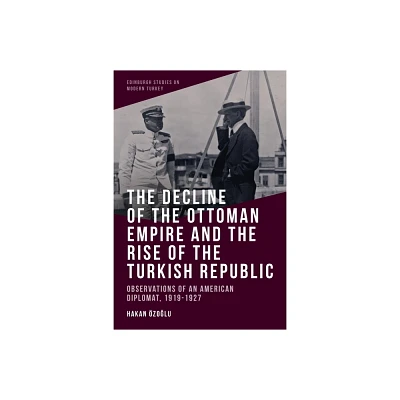Home
The Russo-Turkish War, Vol. 1: Including an Account of the Rise and Decline of the Ottoman Power, and the History of the Eastern Question (Classic Reprint)
Loading Inventory...
Barnes and Noble
The Russo-Turkish War, Vol. 1: Including an Account of the Rise and Decline of the Ottoman Power, and the History of the Eastern Question (Classic Reprint)
Current price: $11.57


Barnes and Noble
The Russo-Turkish War, Vol. 1: Including an Account of the Rise and Decline of the Ottoman Power, and the History of the Eastern Question (Classic Reprint)
Current price: $11.57
Loading Inventory...
Size: OS
*Product Information may vary - to confirm product availability, pricing, and additional information please contact Barnes and Noble
Excerpt from The Russo-Turkish War, Vol. 1: Including an Account of the Rise and Decline of the Ottoman Power, and the History of the Eastern Question
It is to the enterprise of a Frenchman, M. Dc Lesseps, warmly supported by many of his country men, that is due the great undertaking of modern times for uniting Europe with India and Australia by means of a sea canal cut through the Isthmus of Suez. The French have long had a hankering after Egypt. In the reign of Louis XIV. The philosophic politician Leibnitz drew up a paper recommending to the king a conquest of Egypt, from which he anticipated immense benefits to mankind, and especially to France. The memoir was seen by few, but doubtless was known to Napoleon I., who carefully studied it, and en deavoured to put it in practice. His disappoint ment at the ultimate failure of his plan of conquest is said to have drawn from him the complaint that his life was une carriére manquée, a wasted career. The prevailing idea of Leibnitz was that the introduction of a European administration into Egypt would produce more effect in securing the civilization of the East than any other possible proceeding. The reason why the Christian Cru sades produced no lasting result in the East is that they obtained no permanent footing in those regions, nor established any system of government there. Both Philip Augustus of France and Richard Coeur de Lion had striven to capture and retain Damietta, but in vain. Cardinal Ximenes originated a league between Castile, Portugal, and England for the conquest of Egypt; and Michaud, the French historian, believes that the saintly King Louis IX. Meant to colonize the Egyptian territories. He at least established a protectorate over the Latin Christians in Syria that has never yet been absolutely disregarded, and which had no small influence in producing the Crimean War.
About the Publisher
Forgotten Books publishes hundreds of thousands of rare and classic books. Find more at www.forgottenbooks.com
This book is a reproduction of an important historical work. Forgotten Books uses state-of-the-art technology to digitally reconstruct the work, preserving the original format whilst repairing imperfections present in the aged copy. In rare cases, an imperfection in the original, such as a blemish or missing page, may be replicated in our edition. We do, however, repair the vast majority of imperfections successfully; any imperfections that remain are intentionally left to preserve the state of such historical works.
It is to the enterprise of a Frenchman, M. Dc Lesseps, warmly supported by many of his country men, that is due the great undertaking of modern times for uniting Europe with India and Australia by means of a sea canal cut through the Isthmus of Suez. The French have long had a hankering after Egypt. In the reign of Louis XIV. The philosophic politician Leibnitz drew up a paper recommending to the king a conquest of Egypt, from which he anticipated immense benefits to mankind, and especially to France. The memoir was seen by few, but doubtless was known to Napoleon I., who carefully studied it, and en deavoured to put it in practice. His disappoint ment at the ultimate failure of his plan of conquest is said to have drawn from him the complaint that his life was une carriére manquée, a wasted career. The prevailing idea of Leibnitz was that the introduction of a European administration into Egypt would produce more effect in securing the civilization of the East than any other possible proceeding. The reason why the Christian Cru sades produced no lasting result in the East is that they obtained no permanent footing in those regions, nor established any system of government there. Both Philip Augustus of France and Richard Coeur de Lion had striven to capture and retain Damietta, but in vain. Cardinal Ximenes originated a league between Castile, Portugal, and England for the conquest of Egypt; and Michaud, the French historian, believes that the saintly King Louis IX. Meant to colonize the Egyptian territories. He at least established a protectorate over the Latin Christians in Syria that has never yet been absolutely disregarded, and which had no small influence in producing the Crimean War.
About the Publisher
Forgotten Books publishes hundreds of thousands of rare and classic books. Find more at www.forgottenbooks.com
This book is a reproduction of an important historical work. Forgotten Books uses state-of-the-art technology to digitally reconstruct the work, preserving the original format whilst repairing imperfections present in the aged copy. In rare cases, an imperfection in the original, such as a blemish or missing page, may be replicated in our edition. We do, however, repair the vast majority of imperfections successfully; any imperfections that remain are intentionally left to preserve the state of such historical works.


















